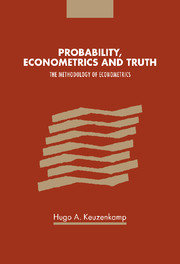Book contents
- Frontmatter
- Contents
- Introduction
- 1 The philosophy of induction
- 2 Probability and indifference
- Intermezzo: a formal scheme of reference
- 3 Relative frequency and induction
- 4 Probability and belief
- 5 The theory of simplicity
- 6 From probability to econometrics
- 7 Econometric modelling
- 8 In search of homogeneity
- 9 Positivism and the aims of econometrics
- 10 Probability, econometrics and truth
- Personalia
- References
- Name Index
- Subject Index
5 - The theory of simplicity
Published online by Cambridge University Press: 22 September 2009
- Frontmatter
- Contents
- Introduction
- 1 The philosophy of induction
- 2 Probability and indifference
- Intermezzo: a formal scheme of reference
- 3 Relative frequency and induction
- 4 Probability and belief
- 5 The theory of simplicity
- 6 From probability to econometrics
- 7 Econometric modelling
- 8 In search of homogeneity
- 9 Positivism and the aims of econometrics
- 10 Probability, econometrics and truth
- Personalia
- References
- Name Index
- Subject Index
Summary
Is it not natural to begin any attempt at analysing the economic mechanism by making the simplest assumption compatible with general theory?
Jan Tinbergen (1940)Introduction
‘The march of science is towards unity and simplicity’, Poincaré ([1903] 1952, p. 173) wrote. In econometrics, this march threatens to become lost in a maze of specification uncertainty. There are many different ways to deal with specification uncertainty. Data-mining invalidates traditional approaches to probabilistic inference, like Fisher's and Neyman-Pearson's methodology. A theory of simplicity is helpful to get around this problem.
Fisher (1922, p. 311) defined the object of statistics as ‘the reduction of data’. The statistical representation of the data should contain the ‘relevant information’ contained in the original data. The decision, about where to draw the line when relevant information is lost is not trivial: Fisher's own methodology is based on significance tests with conventional size (usually, 0.05). At least, Fisher had relatively sound a priori guidelines for the specification of the statistical model. This luxury is lacking in econometrics. Fisher could rely on randomization, to justify his ‘hypothetical infinite population’ of which the actual data might be regarded as constituting the random sample. Chapter 6 shows that economic metaphors referring to this hypothetical infinite population are unwarranted.
Another effort to justify Fisher's reduction can be found in structural econometrics, where the model is based on a straitjacket imposed by economic theory. This provides the a priori specification of the econometric model.
Information
- Type
- Chapter
- Information
- Probability, Econometrics and TruthThe Methodology of Econometrics, pp. 98 - 118Publisher: Cambridge University PressPrint publication year: 2000
